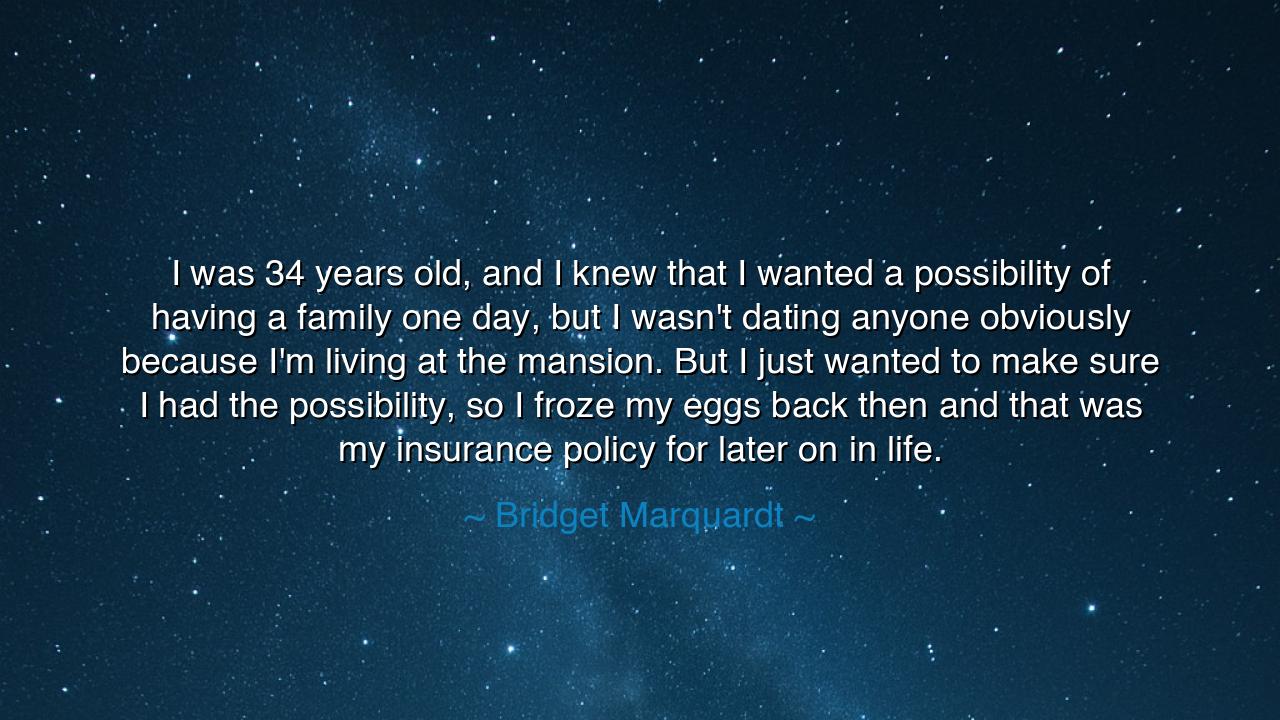
I was 34 years old, and I knew that I wanted a possibility of
I was 34 years old, and I knew that I wanted a possibility of having a family one day, but I wasn't dating anyone obviously because I'm living at the mansion. But I just wanted to make sure I had the possibility, so I froze my eggs back then and that was my insurance policy for later on in life.






In the words of Bridget Marquardt, “I was 34 years old, and I knew that I wanted a possibility of having a family one day, but I wasn't dating anyone obviously because I'm living at the mansion. But I just wanted to make sure I had the possibility, so I froze my eggs back then and that was my insurance policy for later on in life.” — we hear the voice of a woman who gazed into the uncertain horizon of time and chose wisdom over chance, preparation over fear. Her words, though born of modern science, carry an ancient truth: that the wise do not wait for fate to decide their future — they act with foresight and courage to protect the dreams of their hearts.
In this reflection, Bridget speaks of something far greater than biology or technology; she speaks of agency — the sacred power given to every soul to shape its own destiny. Her decision to preserve her ability to bear children is not merely a medical act, but a profound gesture of hope and autonomy. She did not yield to the tyranny of circumstance or the passage of years. Instead, she looked upon her life — complex, unique, and constrained by circumstance — and declared: I will not let time steal my possibility. This is the voice of one who understands that the greatest freedom is not the absence of limits, but the wisdom to plan beyond them.
The origin of these words lies in a moment of clarity that comes to many who live amid glitter and illusion. In the “mansion,” as she calls it — the place of grandeur and spectacle — it is easy to lose sight of life’s quieter, deeper callings: love, family, and belonging. Surrounded by fame yet untouched by intimacy, she recognized that her path might not unfold in the ordinary way. And rather than despair, she turned to foresight — the virtue of the ancients, the practice of planting seeds long before one needs their shade. Her act of freezing her eggs was not vanity, but a vow: a vow to the future self, to the mother she hoped still to become.
In the old tales, we find this same lesson hidden beneath myth and legend. Joseph, in the book of Genesis, when he interpreted Pharaoh’s dream, did not wait for famine to strike before preparing. He stored grain in years of plenty to sustain Egypt in years of want. This was not fear, but wisdom — the same wisdom Bridget showed when she chose to prepare in her season of strength for the days ahead. In both stories, the message is clear: foresight is not a rejection of the present, but a reverence for the future. To prepare is to love what is yet to come.
Her decision also reveals a subtle defiance — a challenge to the expectations that have long confined women. For centuries, society demanded that women’s worth be measured by the timing of others: by marriage, by circumstance, by the decisions of men. But Bridget’s choice breaks this ancient chain. She chose not to wait for permission or for perfect timing. She embraced the tools of her age to carve her own path, reminding all that freedom begins when we claim ownership of our lives, even in matters as intimate as love and creation.
Yet beneath the empowerment lies tenderness — the quiet longing of the human heart. To speak of “wanting a family one day” is to speak of the eternal yearning for continuity, for love that outlives oneself. Even as she planned and protected, Bridget’s words pulse with that most human of desires: to nurture, to belong, to pass on the flame of being. This is the paradox of strength — that even in independence, there is vulnerability; and in vulnerability, there is power. She did not freeze her dreams to escape them, but to ensure they would one day awaken.
Thus, the lesson of this quote is one of foresight, courage, and love. The wise among us do not surrender to the constraints of time or circumstance. They prepare with humility, not fear; with hope, not haste. To act with foresight is not to control destiny, but to honor it — to meet the future halfway, ready and unafraid. We must all learn from her example: to protect what matters most before it is endangered, to make choices today that serve our tomorrows, and to remember that planning is an act of love — for oneself, for one’s future, and for the generations yet unborn.
So, my children, take this wisdom to heart: the world may tell you to wait, to trust to luck or timing. But the wise know that fortune favors those who prepare. Like Bridget Marquardt, be the guardian of your own possibilities. Whether you plant seeds, save for storms, or preserve the dreams that time might otherwise steal — act with courage, act with care, and let your foresight be the vessel through which your future finds its way to life.






AAdministratorAdministrator
Welcome, honored guests. Please leave a comment, we will respond soon